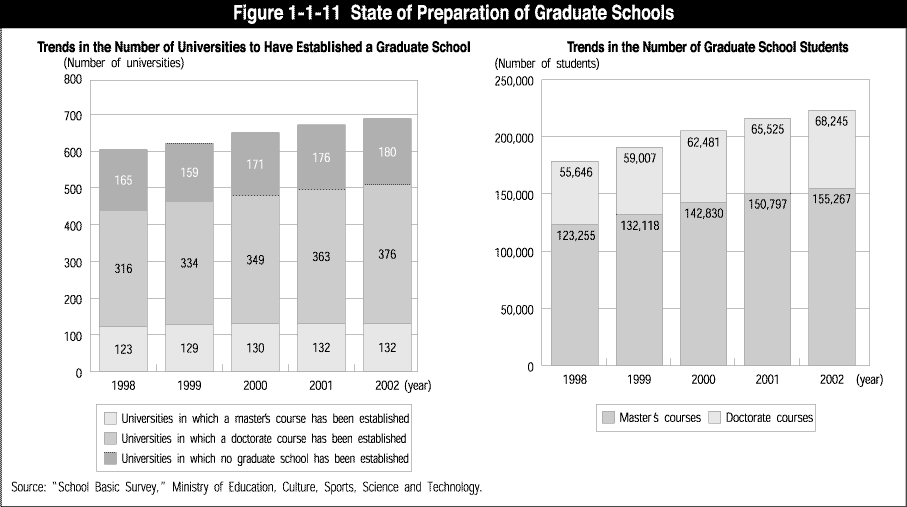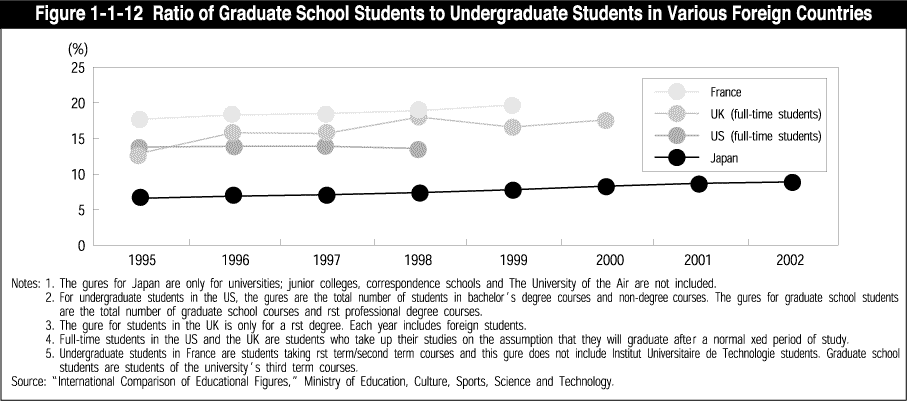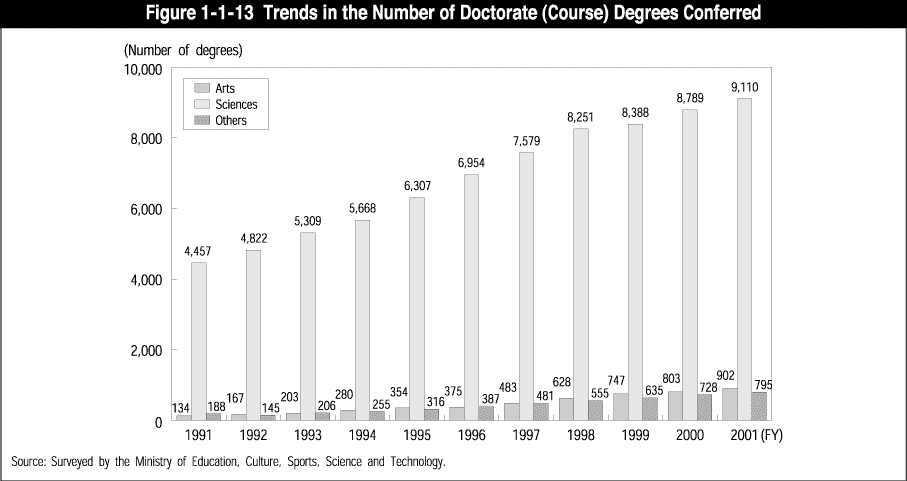| Home > Policy > White Paper, Notice, Announcement > White Paper > FY2003 White Paper on Education, Culture, Sports, Science and Technology >Part1 Chapter1 Section2.2 | ||
Graduate schools have the roles of promoting academic research centered on basic research, and training of researchers and professionals with advanced specialized skills. Currently in Japan, graduate schools have been established in 532 universities, or approximately 80 percent of the 699 national, public and private universities in the country ( Figure 1-1-11 ).

Society has come to expect more and more of graduate schools as a result of the developments in academic research, rapid technological innovation and the advancement and increase in complexity of the economy and society in recent years. In order to meet these demands of the age, and to respond to the new trends in academic research, achieving major qualitative and quantitative enhancements of graduate schools has become an important issue. For these reasons, the following measures are being carried out at MEXT to further advance and revitalize education and research in a variety of forms and in line with the respective aims of each graduate school: 1) making the aim of doctorate courses to not simply train researchers, but also to train human resources that possess advanced ability and abundant knowledge that can be utilized in a variety of areas of society; 2) establishing new forms of graduate schools by systematizing graduate school universities, correspondence graduate schools and professional graduate schools; 3) allowing greater flexibility in entrance qualifications and the required duration of study, including early university entrance, one-year master's courses and long-term student courses; and 4) diversifying educational methods and forms, etc., including the introduction of affiliate graduate schools and graduate schools with day/evening programs, and promoting the establishment of graduate departments, etc. centered on pioneering, interdisciplinary fields.
Concerning the scale of the number of students at graduate schools, the November 1991 University Council Report, "Quantitative Improvement of Graduate Schools," stated that it was "necessary for the scale of graduate schools in 2000 to be expanded to a total of at least twice the current scale." Responding to this recommendation, a range of policies, such as the establishment of new graduate schools (graduate departments, majors) and increases in graduate school entrance quotas, were implemented to quantitatively expand graduate schools, and in 2000 the target was achieved (1991: 98,650 students; 2000: 205,311 students). As of May 2002, this had reached a total of 223,512 students (master's courses: 155,267 students; doctorate courses: 68,245 students), and it can be said that in recent years the scale has expanded dramatically. However, compared with the situation in foreign countries, there is still a gap ( Figure 1-1-12 ).
As graduate schools greet 21st century society, which is increasingly changing and becoming more complex, the three responses particularly required of graduate schools in future are as follows: 1) advancement of academic research and strengthening of functions to train outstanding researchers; 2) strengthening functions to train professionals with advanced specialized skills and adult reeducation functions; and 3) international contribution through educational research. Further improvements in graduate schools in all these respects are necessary. Concerning the ideal scale of graduate schools in future, the October 1998 University Council Report, "A Vision for Universities in the 21st Century and Reform Measures," proposed that:
Based on 1) the current situation requiring the completion of graduate level courses as a basic necessary condition for taking an active part in international society; 2) the necessity of realizing a nation based on the creativity of science and technology for the 21st Century; 3) responding to rapid technological innovation and the rapidity with which knowledge becomes obsolete, and the likely increase in the number of adults demanding an opportunity to receive adult brushup education, * etc.; and 4) assuming that it will be necessary to take into account future changes in industrial structure etc., and that as new industrial fields are created and grow, new demand will be born for human resources with advanced knowledge and ability, it is anticipated that overall it will be necessary to expand to a scale of over 250,000 students.
The Ministry of Education, Culture, Sports, Science and Technology is promoting improvements to graduate schools based on this proposal.

| * Adult Brushup Education |
Adult Brushup Education refers to adults receiving reeducation in specialized fields, etc. at universities and graduate schools, etc. in order to advance and enrich their knowledge and skills that have become obsolete as a result of rapid development in technological innovation and changes in the industrial structure.
Degrees are in principle conferred by universities as certification to the acquisition of knowledge and ability equivalent to the completion of education at the undergraduate or postgraduate levels of universities. For example, the doctorate degree is conferred on people who have completed the doctorate course. The aim of the doctorate course is stipulated to be "the cultivation of the advanced research ability and the abundant academic knowledge necessary to carry out research activities independently in the field of specialization as a researcher, or perform other highly specialized duties" (Standards for the Establishment of Graduate Schools, Paragraph 1, Article 4). Hence, it can be said that the doctorate degree proves that a person has this ability and academic knowledge. However, concerning the doctorate course, even if the course is not completed, if the student passes the doctoral thesis assessment and is deemed to have academic ability equivalent to or greater than that of a student who has completed a doctorate course at that graduate school, the doctorate degree can be conferred.
Concerning the reform of the degree system, the National Institution for Academic Degrees (the current National Institution for Academic Degrees and University Evaluation) was established in 1991 based on a University Council Report, and types of degrees that were tailored to the fields of specialization were abolished. To increase interest in lifelong learning activities, the National Institution for Academic Degrees was established with the task of appropriately assessing diverse study at higher education stages other than university and conferring degrees on those people recognized as being at the same level as those who have completed university or graduate school, while maintaining the principle that universities confer degrees.
In addition, types of degrees were formerly stipulated so that they were tailored to fields of specialization such as "Master of Arts," or "Doctor of Medicine," but to ensure that the conferment of degrees is carried out smoothly in all academic fields, and to respond to academic advancement, these types of degrees were abolished. However, due to the social value of identifying a degree's field of specialization, degrees are conferred with the field of specialization appended (for example, Doctorate (Arts)).
Furthermore, in April 2003, the professional graduate school system was established as a new graduate school mechanism to carry out "practical education specializing in the training of professionals with advanced specialized skills." People who have completed the professional degree course will be conferred the professional degree as a degree that certifies the advanced specialized job skills they have obtained, for example "Master of Business Administration (professional)" or "Juris Doctor (professional)" (in the case of graduate law schools) ( Figure 1-1-13 ) (refer to Part I, Chapter 2, Section 2).

| Back To Top | MEXT HOME |